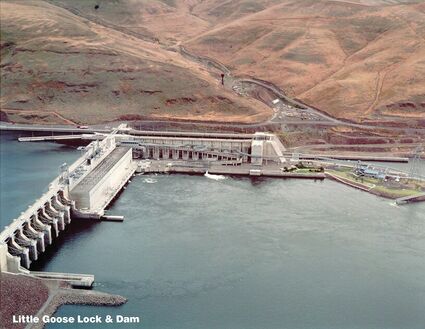Reality on the Governor's Snake River dam report
September 1, 2022

--Submitted photo by Washington Policy Center
Little Goose lock and dam is one of four (Lower Granite, Lower Monumental, and Ice Harbor dams) Gov. Jay Inslee and U.S. Senator Patty Murray target to breach based on recent survey and research on the Snake River dam system.
Todd Myers, Environmental Director at the Washington Policy Center and member of the Puget Sound Salmon Recovery Council, released this statement regarding the release of the governor's report on the Snake River dams.
"The governor's report on the Snake River dams ignores the consensus science on salmon and the Snake River dams, and puts politics before true salmon recovery efforts. Destroying the dams would divert funding from salmon runs at greater risk, would not help Southern Resident Killer Whales, and would increase CO2 emissions. It is a lose-lose-lose for the environment that puts politics before science.
First, the report is extremely sloppy. The original draft cited research from Welch et al. claiming that the dams were harming Snake River salmon runs. That study actually said the opposite, noting that Snake River salmon returns were better than many places without dams across the region. The new report now acknowledges that error, but uses a political statement from the Biden Administration to dismiss the peer-reviewed research. It is clear that the report authors were unfamiliar with the current science and were simply looking for studies that agreed with their preferred result.
Second, the more than $30 billion required to destroy the dams and mitigate the energy and economic damage is equivalent to more than 300 years of Washington's salmon recovery funding. Nowhere does the report even attempt to address whether spending that amount of money on one salmon run is the best way to help endangered salmon across the Northwest. Spending this amount of money without a serious assessment is irresponsible.
Finally, the report acknowledges that destroying the dams would increase electricity costs, increase the risk of blackouts, and increase CO2 emissions.
Having worked on salmon recovery efforts for nearly two decades, it is frustrating to see the state once again put politics ahead of what is best for salmon and the environment."
Myers is the Director for the Environment with the Washington Policy Center.


